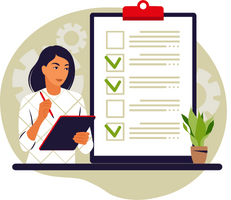Definition of Insurance Premiums (Simple and Illustrated)
English Vocabulary Lesson
This lesson explains in simple words the definition
of insurance premiums. We will also look and examples,
a story dialogue showing how it can be used in everyday
conversations, and a short quiz to test
your understanding.
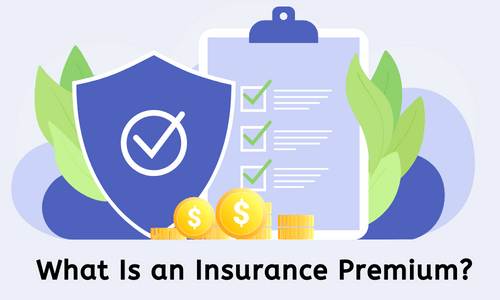
Lesson Table of Contents
1. What Is an Insurance Premium?6. Answers
What Is an Insurance Premium?
First, let's look at insurance. Insurance is an agreement between you and a company. You pay a certain amount of money regularly (for example every month), and the company (called an insurance company) agrees to pay a larger amount of money if something specific happens (for example, an injury, illness, accident, or death).
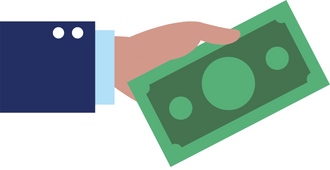


How
Do Insurance Companies Decide How Much You Pay in Premiums?
The insurance company will decide how much your premiums will be
based on different factors. For example:
- How old you are
- Your health
- How much money you want the insurance company to pay out if something bad happens
- Your driving history (for car insurance)
- The type of activity you are doing (for example, if you're playing a sport)
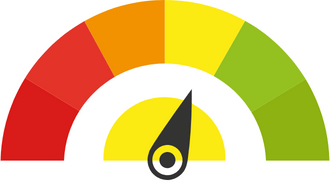

Examples
of How to Use Insurance Premiums in a Sentence
- I had to pay an insurance premium of $200 every month for my car.
- We have to be sure that we can afford to pay our insurance premiums this year.
- She signed an insurance policy and started paying the monthly premiums.
- How can I be sure that my insurance premiums will remain low?
- Is there a way to lower my premiums?
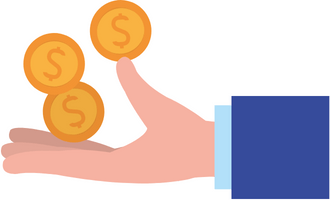
An
Example Dialogue: Using "Insurance Premiums" in Everyday
Conversations
Here is an example conversation between two people about insurance
premiums.
Jared: Oh, yeah? Mine too. $200 more per year!
Karen: I know! Insurance companies make a lot of money from premiums.
Jared: It's crazy. But there's not much we can do, I guess.
Karen: No, I suppose not. We just have to keep paying the premiums if we want to be insured...
Jared: You know, maybe we can call
our insurance agents and see if we can get a better deal.
Karen: That's a good idea. We should call and see if there are any discounts or special offers available.
Jared: Maybe even switch to a different insurance company if the premiums are too expensive.
Karen: But switching companies could be a hassle. Let's call our agents first and see what they can do.
Jared: Sounds like a plan!
Karen: That's a good idea. We should call and see if there are any discounts or special offers available.
Jared: Maybe even switch to a different insurance company if the premiums are too expensive.
Karen: But switching companies could be a hassle. Let's call our agents first and see what they can do.
Jared: Sounds like a plan!
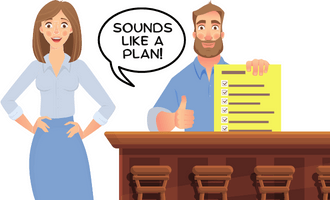
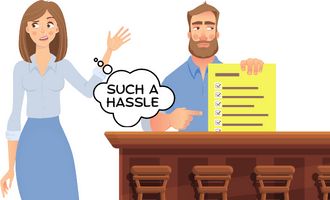
Disclaimer:
This English vocabulary lesson is for informational and
educational purposes only. It is not intended to be a substitute
for professional advice.
Vocabulary Quiz:
Test Your Understanding
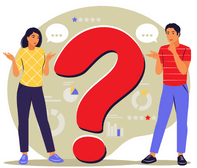
1. What is the meaning of "insurance"?
A) Protection against loss or damage
B) A big sum of money
C) Regular payments you must pay
2. What is the meaning of "insurance company"?
A) A person who sells insurance
B) An organization that sells and provides insurance
C) An organization that invests other people's money to help them financially
3. What is the meaning of "insurance premium"?
A) A large sum of money
B) A contract between you and the insurance company
C) An amount of money paid regularly to an insurance company
4. What is the meaning of "agent"?
A) A person who buys insurance
B) A person who sells vacations
C) A person who organizes deals between others
5. What is the meaning of "insurance agent"?
A) A person who sells insurance
B) A person who provides insurance
C) A person who pays the premiums
6. What is the meaning of "insurance policy"?
A) Regular payments you must pay
B) A signed agreement between an insurance company and you
C) A large sum of money
7. What is the meaning of "to pay out"?
A) To make a big payment
B) To receive money from an insurance policy
C) To provide insurance protection
8. What is the meaning of "periodically"?
A) Regularly
B) Once a month
C) Every year
9. What is the meaning of "hassle"?
A) An annoying inconvenience
B) A big problem
C) A large sum of money
10. Why do people get insurance?
A) To protect against loss or damage
B) To save money
C) To make a profit
A) Protection against loss or damage
B) A big sum of money
C) Regular payments you must pay
2. What is the meaning of "insurance company"?
A) A person who sells insurance
B) An organization that sells and provides insurance
C) An organization that invests other people's money to help them financially
3. What is the meaning of "insurance premium"?
A) A large sum of money
B) A contract between you and the insurance company
C) An amount of money paid regularly to an insurance company
4. What is the meaning of "agent"?
A) A person who buys insurance
B) A person who sells vacations
C) A person who organizes deals between others
5. What is the meaning of "insurance agent"?
A) A person who sells insurance
B) A person who provides insurance
C) A person who pays the premiums
6. What is the meaning of "insurance policy"?
A) Regular payments you must pay
B) A signed agreement between an insurance company and you
C) A large sum of money
7. What is the meaning of "to pay out"?
A) To make a big payment
B) To receive money from an insurance policy
C) To provide insurance protection
8. What is the meaning of "periodically"?
A) Regularly
B) Once a month
C) Every year
9. What is the meaning of "hassle"?
A) An annoying inconvenience
B) A big problem
C) A large sum of money
10. Why do people get insurance?
A) To protect against loss or damage
B) To save money
C) To make a profit
1. A | 2. B | 3. C | 4. A | 5. A | 6. B | 7. B |
8. A | 9. A | 10. A
Get Updates, Special Offers, and English Resources
Download your FREE GIFT (the first two chapters of
English Short Stories Book and Workbook)
as soon as you join!

By submitting your email, you consent to receiving updates and newsletters from us and to the sharing of your personal data with third parties for the purposes of sending you communications. We will not spam you. You can unsubscribe at any time. For more information, please see our privacy policy.

